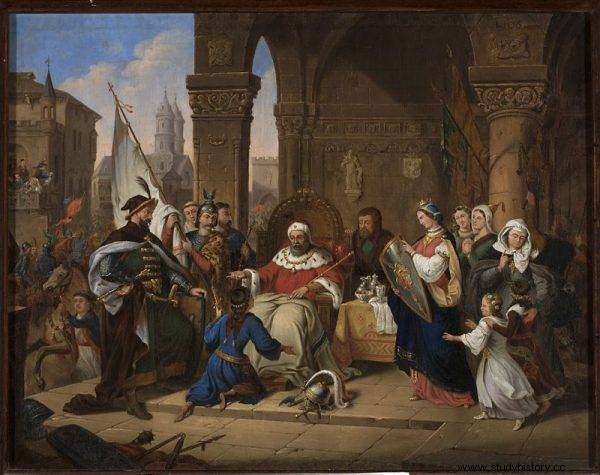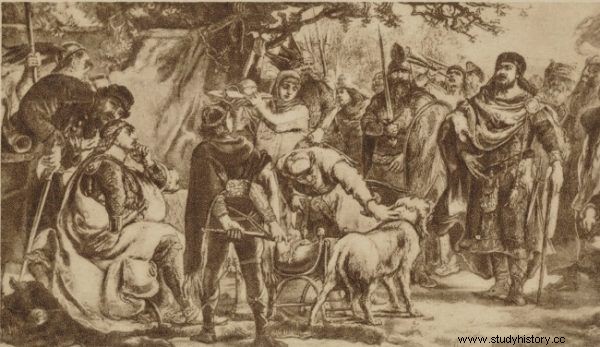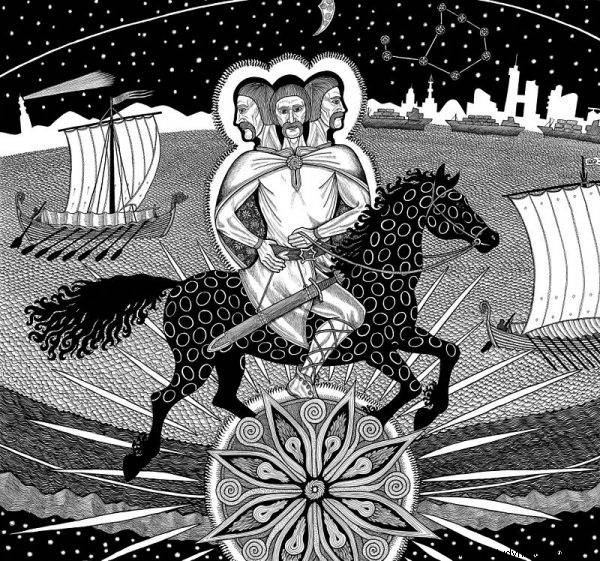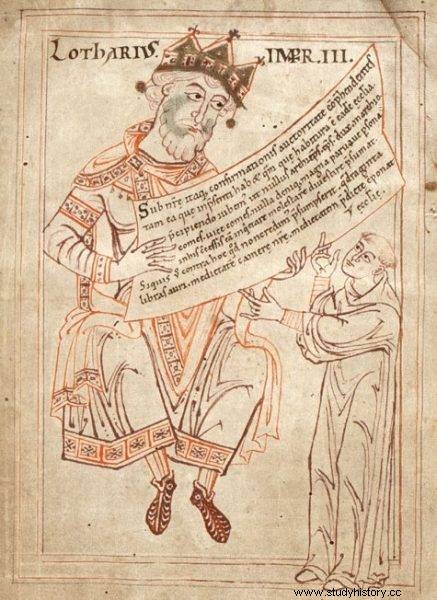The servants of Triglav, who devoted themselves to dark rites, had to reject their false idol, declaring their faith in one true God - Jesus Christ. Otherwise, their death at the hands of the Piast warriors awaited them. But it was not only about faith, but about politics and business. After all, in the Baltic "ocean" fresh fish waited for the conquerors, not salty and stinking. In 1121, Bolesław Krzywousty conquered Pomerania. He dealt with the pagan land extremely bloody.
Rich and rebellious Pomerania, trading with Germany and Scandinavia, but also invading and looting mercilessly (expeditions of Slavic pirates - chasers - including to Denmark and Germany) and still pagan - for generations was the object of the Piast rulers' wishes.
It is true that Mieszko I managed to subjugate this rich land to himself along with the then-pagan and wealthy Wolin, but later, after the collapse of the state under his grandson Mieszko II, the Piasts lost access to the Baltic Sea. With him lost not only thousands of heads that could be baptized, but the enormous profits from the trade in amber, leather and even people. Because although officially slavery in the Christian state was forbidden, the princes returned from each trip, dragging the captives with them.
20 years of war
Bolesław Krzywousty sent his warriors north after taking power in his district, after the expulsion of the palatine Sieciech. He was only 16 when he led the first victorious expedition against Pomeranians. It was then that Białogard was conquered. The city was almost marched, then plundered and razed to the ground. Apparently, Bolesław took from there countless treasures. It seemed the ambitious prince would continue his expansion, but during this time other problems arose.
The initial successes of Bolesław irritated Zbigniew's older brother. He was even ready to promise a feudal tribute to the Czech Bořivoj to reassure the Piast junior. Boleslaw, on the other hand, did not intend to submit to his brother. He looked for support in Rus. The marriage with Zbysława Świętopełkówna was a sign of the alliance with Kievan Rus.
Ultimately, after Bolesław's unsuccessful retaliatory expeditions to Moravia, in exchange for a considerable amount of money, the Czechs gave up their alliance with Zbigniew, and a year later Krzywousty invaded Pomerania again - this time Kołobrzeg. The duke's warriors, after 6 days of march from Głogów, reached the Baltic Sea and stood in front of a heavily fortified stronghold.

Bolesław Krzywousty sent his warriors north after taking power in his district, after the expulsion of the palatine Sieciech. He was only 16 when he led the first victorious expedition against Pomeranians.
The bold attack surprised the borough. The city surrendered, but the success was only partial. As Gall Anonim writes, the warriors of the Polish prince, at the sight of the treasures of the Kołobrzeg townspeople, lost all will to continue the fight, and yet there was still a city to be conquered . "[...] the abundance of riches and loot in Pomerania blinded the bravery of knights and thus fate saved its city from the hands of Poles" - reports the chronicler.
After this invasion, the prince abandoned his attempts to conquer Pomerania for four years. He was occupied with rivalry with his brother. Another expedition to the north started in 1107. Boleslaw decided to go on a trip in winter, which was unusual at that time. All this to make it easier to approach Pomeranian towns on ice-bound, usually marshy ground.
So it happened. Bolesław's armies again conquered, rebuilt and strengthened Białogard. The prince thought that he was facing a difficult journey and a long siege, so he even ordered the construction of siege machines. It turned out, however, that the city gave up almost without a fight. The news of the Piast invaders must have caused fear, as the inhabitants of Kołobrzeg did the same. Gall Anonym mentions:
( offering themselves and (their) faithful services to (him).After a five-week campaign, the prince returned to Greater Poland in glory, at the same time carrying loot and dragging the captives, which were then manned by servant villages to the ducal seats. In turn, Bolesław left his garrisons in the conquered towns to guard the new gains of the Piast state. The grip of the Piasts grew stronger. In 1109, Krzywousty's troops defeated the Pomeranian people near Nakło. Later, other pagan castles surrendered:Wyrzysko, Łobżenica, Kraina, Wysoka, Piła and Złotów. The border between pagan Pomerania and the Christian state of the Piasts strengthened along the Noteć.
From the seats of the Prussian tribes to Rügen
However, the prince had to cease further expansion, because he himself was attacked. Zbigniew was effective against Krzywousty in Germany. The emperor's army invaded Poland, but the war with a stronger enemy turned out to be victorious for the Piast state. Henry V was unable to break the defenders of Silesian strongholds - including Głogów. Tormented by the climbs of Krzywousty, he finally withdrew, and Bolesław could return to the implementation of the idea of the fix of his life, i.e. the conquest of the entire Pomerania - not the narrow belt along the Oder or the wedge in Central Pomerania, but the entire Slavic Pomerania, from the seats of Prussian tribes to Rügen.
The favorable settlement of the conflict with Germany significantly increased Bolesław's political power. In the meantime, Bolesław was extremely severe in dealing with his older brother. Zbigniew, who, despite his exile, still felt the ruler of the entire state and paraded with the royal retinue after his return to Poland, was blinded. He died shortly after.

Krzywousty dealt extremely severely with his older brother. Zbigniew, who, despite his exile, still felt the ruler of the entire state and paraded with the royal retinue after returning to the country, was blinded. He died shortly after.
Bolesław Krzywousty, although he struggled with the "image crisis" and political after this sentence and had to make a show pilgrimage to the monastery in Hungary as part of penance, finally had a free hand. He got rid of Zbigniew, defeated the emperor and normalized the situation with the Czechs. He could finally get back to making his big dream come true.
For this purpose, he first launched an invasion of the warlike, pagan Prussians. In 1115, the prince's warriors organized a bloody rally through the tribal headquarters. Then they launched an attack on Gdańsk Pomerania. Fights for this area lasted intermittently for four years, but Bolesław finished his job. Power was lost by the dukes of the conquered Gdańsk and Słupsk, who from then on were only commanders of the castles annexed to the Piast state.
The Baltic metropolis
The culmination of the conquest of Pomerania was for Krzywousty to deal with its western part, then ruled by a pseudo-Christian prince from the Gryfit family - Warcisław I. Warcisław, although during his stay in Germany as part of the exchange of hostages from the rulers' families (which was then common) baptize, but he did not flaunt it or even try to implement faith in Christ. During his reign, a pagan cult with the chief deity - Trygław - flourished in Szczecin and other towns.
If historians are to be believed, the Polish prince invaded West Pomerania with a powerful army. Although Gall Anonymous presented him as an ambassador of peace, acting only in a just cause, Boleslaw did not hesitate to bloodyly deal with the defeated. Pomeranian castles were demolished, and the people in the thousands went into slavery. The war was very brutal.
(…) Also the fortified and strong city was crushed and set on fire by Nakiel, the whole area was ravaged with fire and iron, so that the inhabitants showed us ruins, ruins and piles of corpses in various places three years later, as if after a fresh defeat (…) - described Herbord - the author of "Lives of St. Otto of Bamberg ", to whom he had to proclaim to the massacred by the Christian Pomeranian prince the truth of faith about love of neighbor.
To this day, historians have been arguing about which city this was razed to the ground. Has Krzywousty won Nakło nad Notecią again, or is it about Nieładz near Gryfice or some other place? In any case, after this victory, Bolesław only had to reach for the pearl in the crown - the largest and most important city at that time of the entire "Polish" Pomerania - Szczecin.
At that time, the city had about five thousand inhabitants. At that time, it was a real metropolis - a well-fortified, rich city and a trading emporium.
Boleslaw realized that Szczecin might not be easy to conquer, especially since the town was surrounded by a swampy, swampy area . He was lucky, however. The people of Szczecin let themselves be approached. The Piast army struck in winter, when the ground was frozen. The warriors unnoticed their way to the city ramparts and attacked by surprise. Herbord reports:
And the capital of the entire Pomerania, the city of Szczecin, which, surrounded by swamps and waters, was considered inaccessible to any enemy, in winter, when the water was cut by frost, not without danger over the ice he struck his army with an unexpected defeat.
The conquered Szczecinians had no choice - if they wanted to avoid the slaughter, they had to be baptized:"they bowed so much that those who were allowed to escape death and captivity by the prince, together with his ruler, swore that they would accept Christianity and pay tribute."
According to Herbord, the fights in Pomerania cost the lives of as many as 18,000 warriors, and Krzywousty relocated 8,000 families to Wielkopolska . In reality, however, the prince did not have the military, political and organizational strength to incorporate Pomerania and other captured lands directly into his country. That is why he made Warcisław I his vassal. He undertook to pay tribute in the amount of 500 silver silver, to support Bolesław in war expeditions, to spread the Christ's faith and to help in the Christianization mission of Bishop Otto of Bamberg, whom Bishop had brought to Pomerania on his own.
The Apostle of Pomerania and dark rituals
Was he that believer? Historians, although they do not want to depreciate his faith, see this move as a political genius. The Piast prince seeking permission from the pope for the mission himself became its military guardian, which gave him a great alibi for further conquests - in the name of Christ, of course. Thus, he boldly went to the Polabian areas, for which the Saxons were also striving.

The servants of Triglav, who devoted themselves to dark rituals, had to reject their false idol, declaring their faith in one true God - Jesus Christ. Otherwise, they would die at the hands of the Piast warriors.
Europe at that time lived by the idea of crusades. Thus Bolesław was a Christ knight who fought pagan ignorance with his sword. And this was supposed to be really dark - if you believe the chronicler's account of the missionary's life, Otto, later called the "Apostle of Pomerania", reported on widespread human sacrifice among the pagans - the custom of killing female babies, especially in times of hunger , to appease the deities and to increase the male population for war and defense purposes. Herbord wrote:
On the third day he came to Pyrzyce, the first Pomeranian town; there he kept its inhabitants for fourteen days, encouraging them to faith (...). And on the day of the birth of John the Baptist he came to a great city called the Stone (...) There, while teaching the truths of faith, it was learned from women that they were killing infants - in the cruelty of paganism they were supposed to kill girls .
It turned out, however, that the Pomeranians, even despite the bloody invasion, do not intend to abandon their beliefs. During his first stay in Szczecin, the missionary was thrown with stones and had to escape. Only Krzywousty's intervention and the threat of another invasion of the city, but also a promise to reduce the tribute for the Piast ruler, convinced the elders to be baptized in public. He converted, among others Domasław - one of the most important people in the city, thus urging many to adopt the new faith. The Slavic shrine was destroyed in front of the inhabitants, and a church was built in its place.
Rally on the Połaba
During the first Christianization mission, the construction of 11 churches began, and Otto and his priests baptized 22,000 people in Pomerania. Nevertheless, a few years later an anti-Christian uprising, inspired by pagan priests, broke out. The rebellious Szczecin shed its new faith, pagan priests took over and demolished churches, and the people were returning to their former cult.
In the meantime, the political situation changed to the detriment of Bolesław - Pope Callixt II and the German Emperor Henry V. In the face of political turmoil, Warcisław I tried to become independent and invaded the northern borders of the Piast state. Ultimately, however, Warcisław well remembered the bloody lesson from the conquest of Pomerania by Krzywousty. He humbled himself. He proposed to Otto from Bamberg to organize a second missionary expedition with Bolesław, this time deep into the Elbe - to the Slavs west of the Oder.
Krzywousty, already during the conquest of Szczecin, moved further west, where he acquired the seats of Slavic pagans in Western Pomerania in today's Germany. After the death of Henry V, the Polish prince competed for these lands with the German king, later Emperor Lothar III.

After the death of Henry V, the Polish prince competed for these lands with the German king, later Emperor Lothar III.
In 1130, in alliance with Warcisław and the Danish prince Magnus Strong, who donated his fleet for the expedition, he set off for Rügen, inhabited by Ranów - a strong tribe of the Polabian Slavs. It is here - in Arkona - that the famous Świętowit temple was located, supposedly guarded by 300 warriors. Bolesław got to Rügen and probably managed to force a tribute to the faithfulness of Ranów (according to some historians, he reached the island, but did not get it).
Short happy end
In 1135, at the congress in Merseburg, the Piast prince met with Emperor Lotar III, with whom he competed for years on the Połabie. The convention was a political success for Bolesław. The emperor recognized the Polish right to Pomerania, although Bolesław had to pay tribute to these lands.
The ruler who devoted his whole life to - as the chronicler Gall Anonym wrote, quoting the alleged song of the Warriors' warriors - set off for fresh fish, "in the splashing ocean", to finally achieve his goal. He played hard and boldly. He skillfully used military and political force. Although not without brutal violence, Christianizing the Baltic lands, he actually included them in the current European civilization.
However, after his death, the worshiped Pomerania did not stay with Poland for long. The mistake of the Wrymouth himself contributed to this - the division of the country into districts. The broken state was losing its influence in Pomerania, which was successively built by the Germans.
Eventually, in 1269, the Duke of Gryfice, Barnim I, became a vassal of the Brandenburgians. Thus, West Pomerania fell into the orbit of the influence of the German Empire. For nearly 800 years, Poland lost the lands that the first Piasts fiercely strove for. Poland's return to the Baltic Sea - to Wolin, Kołobrzeg and Szczecin - took place only after the Second World War.
Bibliography:
- Boras Z. , Dukes of Western Pomerania , Poznań 1996.
- Dopierała B., Polish fate of Western Pomerania , Poznań 1970.
- Fabiańczyk L., Apostle of Pomerania , Szczecin 2001.
- Kozłowski K., Podralski J., Gryfici. Dukes of Western Pomerania , Szczecin 1985.
- Maleczyński K., Bolesław III Krzywousty , Warsaw-Krakow-Gdańsk 1975.
- "Western Pomerania in Otto's Lives", edited by Andrzej Magierski, Warsaw 1979.
